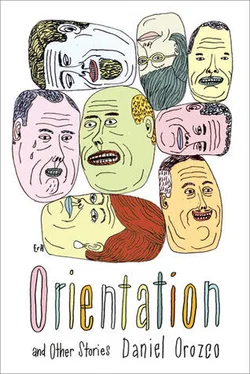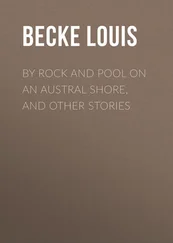April went out for lunch. She always went alone. If she got back early, she’d spend the rest of her hour with the guys on the stock floor. She didn’t socialize much with the women in Receiving. She was the youngest one in there.
A few weeks after she started, she came up on the dock on her way back from lunch. “So,” she said to me, “you’re the New Guy.” She lit a cigarette and asked me why I ate alone. I told her it was because of the cigarette smoke inside. She looked at the cigarette she’d just lit, and laughed. And she put it out. From then on, just about every day, she swung by and talked to me, fiddling with an unlit cigarette. I had nothing to say, but she didn’t seem to mind. She was a talker. She told me that. “So that makes you the listener,” she said. So she talked, and I listened, sitting on the dock while she stood leaning against a stack of pallets. When I got tired of squinting up at her, I looked at my food. Sometimes I looked out over the lot, where you could see the heat wiggle up from the blacktop. It was hot that summer. April had just moved here, and I remember her saying how she was discovering the place, getting to know the bus system, finding the neighborhood pubs and the secondhand shops, doing all the tourist things. She rode the dinner train up to the capital once and did the tour of the abandoned prison over in Old Town. She went to the zoo. I hadn’t been there since I was a kid. They charged admission now. And they were getting rid of the cages. There was an Otter Island, and a Gorilla Haven. The cats where getting their own places, too, a savanna for the lions and grottoes with pools for the panthers and tigers. I was born here, and April already knew more about the city than I ever would.
Sure enough, the guys started in on me. Eugene wanted to know if she was a moaner or a screamer. Dave asked if we had set a wedding date, and if we were registered at any of the doughnut shops. Ruben laughed with the rest of them. But whenever we were alone, he said I should ask April out. He said that she wanted me and that it would be a waste to not go for it. I told him I didn’t even like her. “Fuck like,” he said. “What’s like got to do with anything?” He wouldn’t leave it alone. He wouldn’t leave me alone. I’d be working the floor and he’d be running up and down the aisles looking for me, whispering at me through the shelving that pussy was a gift from God, or cornering me with his cart to tell me that I had a duty as a man. We hadn’t said ten words to each other in years, and here he was getting all worked up about my duty as a man. I never liked Ruben. Who was he to tell me about being a man? Who was he to tell me anything?
* * *
She asked me about my running. I told her. I kept it simple, sticking to my regimen, telling her what I do and not getting near why I do it. She was playing with her unlit cigarette while I talked, flipping and catching it in her hand. But she was listening. So I told her she could do it, too, if she wanted. She was about my age, maybe younger, so it wouldn’t take long to get a routine going, and to see results. She just smiled and shook her head. She put the cigarette she was playing with in her mouth and lit it. “I lack discipline,” she said. “Which is something you’ve got a lot of.” She blew a thin stream of smoke above her head and swatted at it to keep it away from me. She was right. It was something I had a lot of.
Another time she brought it up again. She asked about my regimen, and it turned into this interrogation. She wanted to know what time I got up every morning and how long I stretched for. She wanted to know how long I spent on my calves, on my thighs, on my neck. She asked what direction I headed in when I ran and what streets I turned on and whether I took the same streets back. She stood above me with the sun at her back and fired her questions at me. I answered every one of them. It was kind of a game, like a lawyer and a witness, and I let myself get caught up in it because I thought she really wanted to know about what I did, that the details of my regimen, and my absolute knowledge of them, were bringing her around somehow. I was wrong. She bent down all of a sudden, real quick, and leaned in close. I could smell her hair. I could’ve looked down her blouse if I wanted to. And she said, “Well, maybe discipline is something a person can have too much of. Don’t you think?” And the way she was looking at me, I realized she wasn’t interested in running at all. I didn’t say anything. She straightened up and checked her watch and walked back inside. Lunch was over.
She was looking at me like she knew something about me, as if you could know a person just by looking in his face. She thinks she knows me. She doesn’t know anything about me. I’ve looked at my face. You can’t see anything in it.
* * *
Here’s something about me. I was running around the lake one afternoon when this woman fell into step alongside me. She ran well, with her legs in full extension. She clipped along in smooth, even strides, her shoulders slack and her arms relaxed, swinging in little arcs along her rib cage. There wasn’t a single wasted motion about her. She ran with me. We didn’t say a word. After four laps around she tapped me on the shoulder. She smiled and said thanks. I watched her pull off and head down a path toward the streets. I went to the lake regularly for a few months after that. I never saw her again.
When you run, you aspire to an economy of motion that has only one goal: to optimize the intake of oxygen so that you can keep running. Anything that impedes this one goal must fall away.
I don’t remember the woman’s face anymore. All I remember is the way she moved, the way everything about her was contained and effortless and perfect. Sometimes I imagine her alongside me when I run, and I try to match my every movement to hers. Our shoulders jostled each other when we rounded the turns that day. Her hair was in a single braid, a thick rope of hair that swayed across her back. You could hear it swish against her windbreaker. The rhythm of it paced us both.
When I told Dot about this woman, I remember her sighing and shaking her head, telling me to just let it go. If more people did that, she said, if they just left each other alone, there’d be less disappointment in this world. I’ve realized that everything Dot ever told me, all of her advice for me, came from somebody I didn’t know much about. I knew her husband was dead and that she had other kids besides Phil. They came up in passing when we talked. She never said anything bad about them, but she never said anything good about them, either. I didn’t know if she had any grandkids. I didn’t know what she did outside of work. I didn’t even know where she lived. Dot never smiled. “Bad teeth,” she told me once. But I remember her smiling when she told me this — the only time I’d seen her do that — and her teeth were fine. She didn’t sleep well, so she was always tired, and she moved around the office carefully, hanging on to the edges of desks and cabinets. She was a small woman, but she moved with this weight in her, like her gravity was different from everybody else’s, as if it took everything she had just to get across the room or to get through the day.
When I told Dot about the woman at the lake, she said as long as I was happy, why chance it with anybody else? Why risk what you’ve got for something you may never have?
* * *
So we went on a date. April caught me after work and asked if I wanted to buy her a drink. She gave me directions to a place she knew. “Turn right here,” she said. “Left up there.” She used her unlit cigarette as a pointer. She said she liked my car. It’s a ’69 Olds that belonged to my father, and he took good care of it. Change the oil every three months, he’d told me, wash it every other week, catch all the rust spots before they spread — do that and a car will last forever. That’s what my father taught me. April said that’s a good tradition to have, keeping the family car in shape.
Читать дальше












